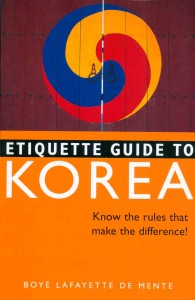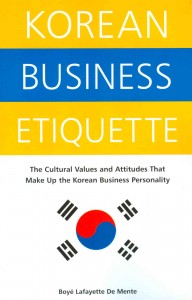 Boyé Lafayette De Mente has been writing books on Asian themes for decades. And not just books on Asian etiquette, either. He’s written on Asian women, Hawaiian culture, and Japanese Geisha. He certainly qualifies as an old Asia Hand. So it shouldn’t have surprised us here at WoWasis that Korea’s been on the Korea beat, as well, with two books that, while offering some crossover material, are really for two different audiences, Etiquette Guide to Korea, and Korean Business Etiquette. They both offer information about Korean culture that is both timeless and timely, and the information is as pertinent today as when the books were written.
Boyé Lafayette De Mente has been writing books on Asian themes for decades. And not just books on Asian etiquette, either. He’s written on Asian women, Hawaiian culture, and Japanese Geisha. He certainly qualifies as an old Asia Hand. So it shouldn’t have surprised us here at WoWasis that Korea’s been on the Korea beat, as well, with two books that, while offering some crossover material, are really for two different audiences, Etiquette Guide to Korea, and Korean Business Etiquette. They both offer information about Korean culture that is both timeless and timely, and the information is as pertinent today as when the books were written.
Etiquette Guide to Korea: Know the Rules that Make the Difference! is a 128 page book that was published in 2008 (ISBN 978-0-8048-3948-8). There’s a lot in here that relates to the Confucian aspect of Korea, so simple concepts like politeness, respect for elders, emphasis on education, and avoiding bragging, could be applied to just about every Asian country. As usual, though, de Mente has his zingers. In hot, humid SE Asian countries (Korea’s not one of these, but bear us out), westerners are known among the local population for smelling badly. To put it plainly, lots of western travelers have a BO problem. De Mente here mentions that roughly half of Koreans don’t have apocrine glands, which produce BO. It turns out that he’s right, statistics bear this out (that’s why deodorant can be hard to find in Korea).
Where the author really shines, though, is in his assessment of what types of things drive Koreans crazy about some westerners. He discusses the concept of ‘han,’ or unrequited resentment (don’t just “let it go” if you make a Korean angry). He emphasizes the drive for education, often resulting in students spending 5 hours a day in special schools “after school.” Koreans are self-sufficient, and the slogan “Yolshimhi hapsida,!” or “Let’s do our best” has served as a keynote for the last 50 years, in evolving Korea from a developing nation to a technology and economic leader.
As with any Asian country, there’s a lot of “Golden Rule” philosophy here. Treat others as you wish to be treated. But even westerners who are quite good at that still need to understand why they need to remove their shoes before they enter a Korean’s home.
 On the other hand, Korean Business Etiquette: The Cultural Values and Attitudes that Make Up the Korean Business Personality (2004, ISBN 0-8048-3582-9) is a riveting 192 page book that is indispensable for any westerner doing — or wishing to do – business in Korea. The book is replete with mistakes that have made by westerners and the means of correcting them, or better yet, not making them in the first place. Some of just many of the terrific comments in this book concern the fact that Koreans don’t like westerners that brag, that western hiring managers should take class structure and schools into consideration, and that “calling high” doesn’t always work, due to the strict structure of Korean business protocol. The value of hiring a local consultant to guide western managers through the seemingly bottomless pit of Korean regulations and business practices is emphasized throughout, as is the value of personal business relationships as a means of helping to ensure that contractual elements are adhered to (as the author states, Koreans have a different view of the value of the western contract). There is also quite a bit here about some critical do’s and don’ts revolving around Korea’s business drinking culture. This book is especially valuable to western businesspeople who are going to Korea for an extended length of time, and should be read well before they get on the flight to Seoul.
On the other hand, Korean Business Etiquette: The Cultural Values and Attitudes that Make Up the Korean Business Personality (2004, ISBN 0-8048-3582-9) is a riveting 192 page book that is indispensable for any westerner doing — or wishing to do – business in Korea. The book is replete with mistakes that have made by westerners and the means of correcting them, or better yet, not making them in the first place. Some of just many of the terrific comments in this book concern the fact that Koreans don’t like westerners that brag, that western hiring managers should take class structure and schools into consideration, and that “calling high” doesn’t always work, due to the strict structure of Korean business protocol. The value of hiring a local consultant to guide western managers through the seemingly bottomless pit of Korean regulations and business practices is emphasized throughout, as is the value of personal business relationships as a means of helping to ensure that contractual elements are adhered to (as the author states, Koreans have a different view of the value of the western contract). There is also quite a bit here about some critical do’s and don’ts revolving around Korea’s business drinking culture. This book is especially valuable to western businesspeople who are going to Korea for an extended length of time, and should be read well before they get on the flight to Seoul.
Leave a Reply